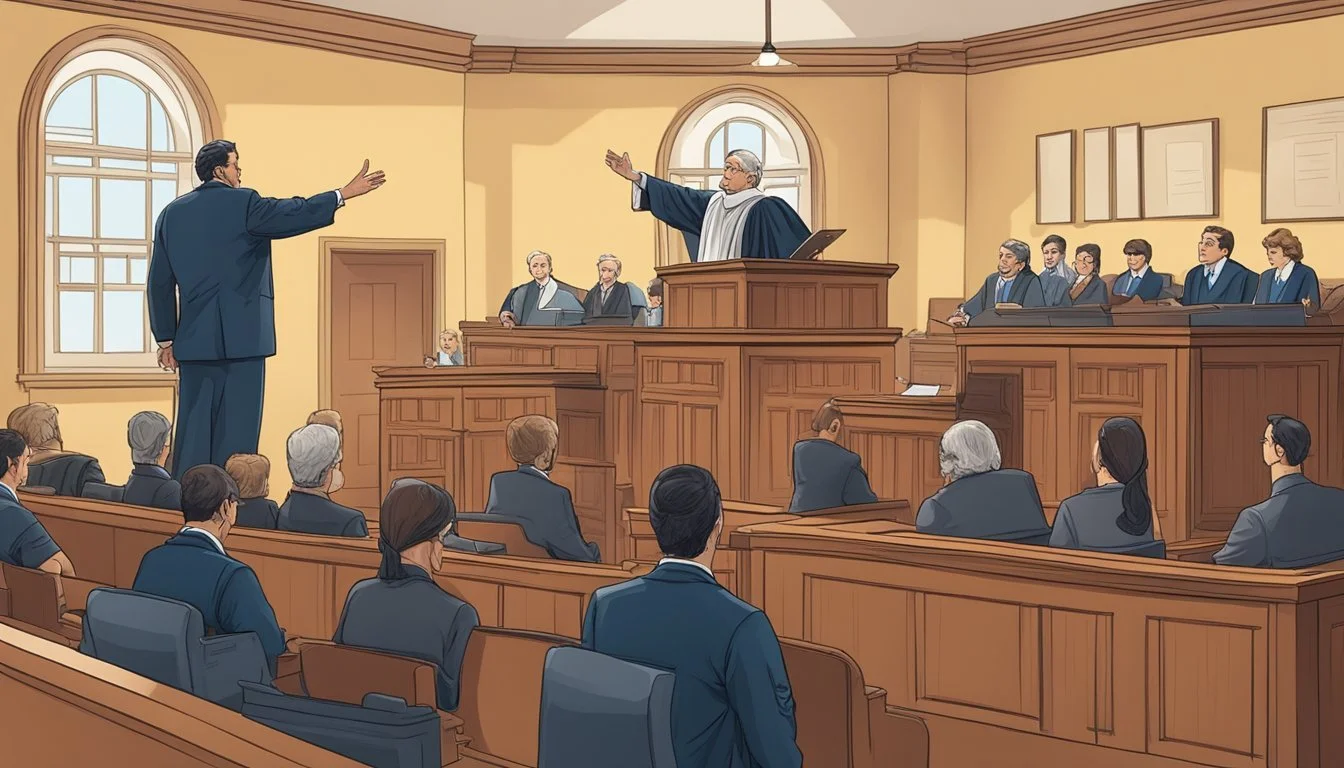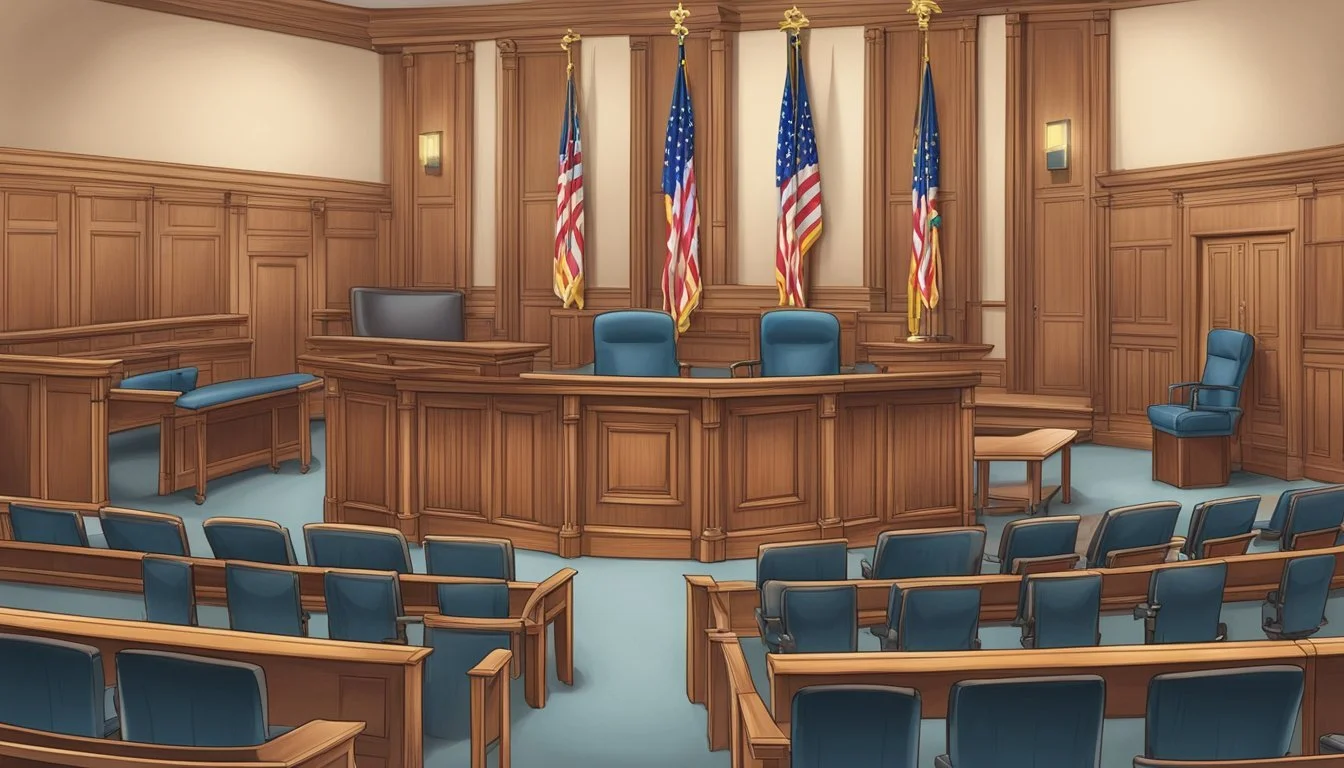Legal Proceedings Conclude in Trump Criminal Case
Former President Faces Legal Reckoning
On May 30, 2024, Donald Trump made history as the first former U.S. president to be convicted of criminal charges. A New York jury found him guilty on 34 felony counts of falsifying business records related to hush money payments made before the 2016 election.
The verdict marked a significant moment in American politics and law, challenging the notion that former presidents are immune from criminal prosecution. The trial centered on a $130,000 payment made to adult film star Stormy Daniels to suppress allegations of an affair with Trump.
The conviction raised questions about Trump's political future and potential legal consequences. As the 2024 presidential election approaches, the impact of this verdict on Trump's campaign and public perception remains to be seen. The case underscores the complex intersection of politics, law, and personal conduct in the highest echelons of American leadership.
Background of The Case
The conviction of Donald Trump stemmed from a complex web of events involving hush money payments, key figures, and alleged financial improprieties. These elements intertwined with his 2016 presidential campaign and subsequent legal scrutiny.
Involvement of Key Figures
Donald J. Trump stood at the center of the case, facing charges related to his actions during and after the 2016 presidential campaign. Michael Cohen, Trump's former personal lawyer, played a crucial role in facilitating the payments at the heart of the controversy. Adult film actress Stormy Daniels received a $130,000 payment to keep quiet about an alleged affair with Trump.
The Manhattan District Attorney's office, led by Alvin Bragg, pursued the investigation and brought charges against the former president. Their efforts focused on unraveling the financial transactions and determining their legality.
Timeline of Events
The case's origins trace back to 2016, when the alleged hush money payment to Stormy Daniels occurred. This payment became public knowledge in 2018, sparking investigations and legal scrutiny.
In 2019, Michael Cohen testified before Congress about his involvement in the payments. The Manhattan DA's office intensified its investigation in the following years.
On May 30, 2024, a jury found Trump guilty on 34 felony counts. This verdict marked a historic moment as the first criminal conviction of a U.S. president, current or former.
Legal Charges and Definitions
The charges centered on 34 counts of Falsifying Business Records in the First Degree. This felony involves making or causing false entries in a company's records with intent to defraud.
Prosecutors alleged that Trump orchestrated a scheme to conceal damaging information and unlawful activity through these false records. The charges specifically related to how the hush money payments were recorded and reimbursed.
Each count carried potential prison time, making the case significant not only politically but also legally for the former president.
Trial Proceedings
Donald Trump's hush money trial unfolded with intense scrutiny and historic significance. The proceedings included careful jury selection, presentation of key evidence, and strategic maneuvers by both prosecution and defense teams.
Jury Selection and Role
The trial began with a meticulous jury selection process. Potential jurors faced questions about their ability to remain impartial given Trump's high profile.
The court seated 12 jurors and alternates, tasked with evaluating evidence and determining Trump's guilt or innocence. Judge Juan M. Merchan instructed jurors on their responsibilities and the legal standards they must apply.
Jurors played a crucial role in assessing witness credibility and weighing the evidence presented throughout the trial.
Testimonies and Evidence Presented
Prosecutors called key witnesses to testify, including Michael Cohen, Trump's former attorney. Cohen provided testimony about his role in arranging the hush money payment.
The prosecution presented financial records, emails, and other documents as evidence to support their case. They aimed to prove Trump's involvement in falsifying business records.
Defense attorneys cross-examined witnesses, attempting to challenge their credibility and interpretations of events.
Defense and Prosecution Strategies
Todd Blanche, Trump's lead defense attorney, focused on discrediting key witnesses and questioning the motivations behind the charges. The defense team argued that Trump's actions were legal and standard business practices.
Prosecutors built their case around the 34 counts of falsifying business records. They sought to demonstrate a pattern of deception and cover-up related to the hush money payment.
Both sides delivered opening and closing statements, framing their arguments and urging jurors to consider the evidence from their perspective. The trial's outcome hinged on whose narrative the jury found more convincing.
Verdict and Reactions
Donald Trump's conviction on 34 felony counts marks a historic moment in American politics. The outcome has elicited strong responses across the political spectrum and raised questions about its impact on Trump's future.
Guilty Verdict Outcome
A New York jury found Donald Trump guilty of falsifying business records related to hush money payments. This verdict makes Trump the first former U.S. president to be convicted of criminal charges. The conviction stems from allegations that Trump orchestrated payments to conceal damaging information before the 2016 election.
The jury's decision followed a trial that captivated national attention. Trump faces potential legal consequences, including fines and possible imprisonment, though sentencing details remain to be determined.
Public and Political Response
The verdict sparked divided reactions among Americans. Trump supporters decried the outcome as politically motivated, while his critics hailed it as a triumph of justice. Many Republicans rallied behind Trump, questioning the fairness of the proceedings.
Democrats largely welcomed the verdict, with some viewing it as accountability for perceived past misconduct. Representative Eric Swalwell stated, "Donald Trump is a convicted felon," highlighting the gravity of the situation.
Political analysts debate the verdict's potential influence on the upcoming election. Some speculate it may energize Trump's base, while others believe it could sway undecided voters.
Impact on Trump's Reputation
The conviction deals a significant blow to Trump's image as he seeks the Republican nomination for the 2024 presidential race. It adds a criminal record to his controversial political legacy.
Trump himself denounced the verdict as a "disgrace" and vowed to continue his campaign. He framed the outcome as a political attack, stating, "The real verdict is going to be Nov. 5 by the people."
The conviction may complicate Trump's efforts to maintain party support. Some Republicans express concern about nominating a convicted felon, while others remain steadfast in their loyalty.
Ultimately, the full impact on Trump's political future remains uncertain as the 2024 election approaches.
Consequences and Sentencing
Donald Trump's conviction on 34 felony counts carries significant legal and financial ramifications. The former president faces potential jail time, hefty fines, and damage to his business empire.
Sentencing Parameters
The judge will determine Trump's sentence based on New York state guidelines for class E felonies. Each count carries a maximum of 4 years in prison. However, as a first-time offender, Trump is unlikely to receive the maximum sentence.
The judge has discretion in deciding whether to impose jail time or probation. Factors considered include the nature of the crimes, Trump's lack of prior convictions, and any mitigating circumstances presented by the defense.
Sentencing is scheduled for November 2024, giving Trump's legal team time to file appeals and potentially delay the process.
Potential Punishment and Probation
While prison time is possible, legal experts suggest probation is more likely. A probation sentence could last 1-3 years and include restrictions on Trump's activities and travel.
Community service is another potential punishment. The judge may order Trump to complete a set number of hours serving the public.
If jail time is imposed, it would likely be served at a minimum-security facility. Trump's age and high profile could factor into decisions about his confinement.
Financial Implications for Trump
The conviction poses significant financial risks for Trump. Potential consequences include:
Fines up to $10,000 per felony count
Restitution payments to victims
Seizure of assets related to criminal activity
Legal expenses for appeals and future cases
Trump's businesses may face increased scrutiny and loss of contracts. Banks could restrict lending, impacting his real estate empire.
The conviction may also affect Trump's ability to secure loans or maintain professional licenses, further damaging his financial standing.
Legal and Political Aftermath
Donald Trump's conviction has sparked significant legal challenges and political consequences. The unprecedented case raises questions about the appeals process, election laws, and broader implications for American democracy.
Appeals Process and Potential Outcomes
Trump's legal team has initiated the appeals process, challenging the verdict on multiple grounds. They argue procedural errors and claim political bias influenced the trial. The appeals could potentially reach the Supreme Court, given the case's high-profile nature.
Possible outcomes include:
Verdict upheld
Conviction overturned
New trial ordered
The timeline for appeals may extend beyond the 2024 election, creating uncertainty for Trump's political future. If the conviction stands, it could result in fines, probation, or even imprisonment, though the latter is considered unlikely for a former president.
Election Law and Future Political Ramifications
Trump's conviction raises complex questions about election law and his eligibility to run for office. While the U.S. Constitution doesn't explicitly bar felons from the presidency, state laws vary on ballot access for convicted individuals.
Key considerations:
State-by-state ballot qualification rules
Potential legal challenges to Trump's candidacy
Impact on Republican primary dynamics
The conviction may influence voter perceptions, with some polls indicating a decrease in support among independents and moderate Republicans. However, Trump's core base remains largely unmoved by legal troubles.
Legacy and Rule of Law Considerations
The conviction of a former U.S. president marks a watershed moment in American history. It underscores the principle that no one is above the law, while also testing the resilience of democratic institutions.
Trump's supporters view the case as politically motivated, potentially eroding trust in the justice system. Critics argue it reinforces accountability for high-level officials. The long-term impact on presidential power and immunity remains to be seen.
The case may set precedents for:
Future prosecutions of political figures
Interpretation of executive privileges
Balance between political and legal spheres
Broader Implications
Donald Trump's conviction marks a watershed moment in American politics and law. It raises important questions about accountability, the justice system, and public perceptions of powerful figures.
Impact on American Justice System
The conviction of a former president sets a significant precedent in the American legal landscape. It demonstrates that even those who have held the highest office are not above the law. This case may influence how future allegations against political figures are handled.
The justice system's ability to prosecute a former president showcases its independence and resilience. It reinforces the principle of equal justice under the law, regardless of status or political influence.
However, the case also highlights the complexities of trying high-profile political figures. The intense public scrutiny and political divisions surrounding the trial posed unique challenges for the court.
Public Trust in Legal Institutions
Trump's conviction has had a polarizing effect on public opinion of the justice system. Some view it as a triumph of accountability, while others see it as politically motivated.
This case has thrust the workings of the legal system into the spotlight, increasing public awareness of judicial processes. It may lead to greater scrutiny of legal institutions and their decisions.
The conviction's impact on public trust varies across political lines. It may strengthen faith in the system for some, while eroding it for others who view the proceedings as biased.
Comparison With Other High-Profile Cases
Trump's case stands out due to his status as a former president, but it shares similarities with other high-profile legal proceedings. Like the Watergate scandal, it involves allegations of abuse of power and attempts to interfere with democratic processes.
Unlike cases involving corporate executives or celebrities, Trump's conviction carries broader political implications. It may influence voter perceptions and shape the narrative of future elections.
The case's outcome could set precedents for how similar cases against political figures are handled in the future. It may also impact how the public views the accountability of elected officials.


